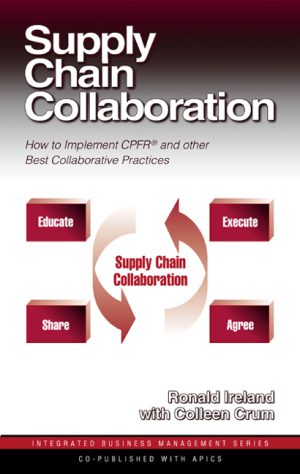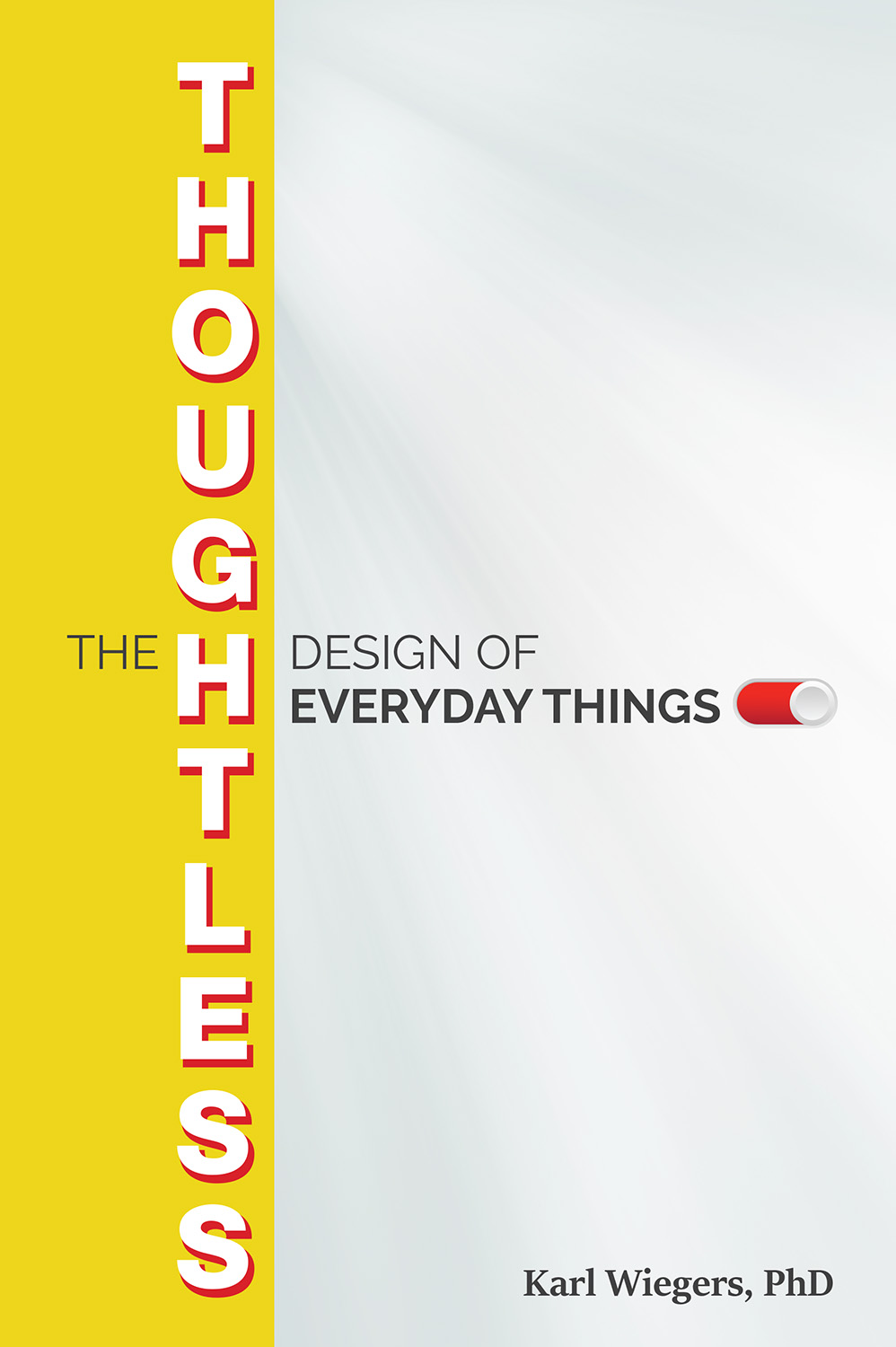The Thoughtless Design of Everyday Things
$33.95
Karl Wiegers, PhD
Softcover, 6×9, 304 pages
ISBN: 978-1-60427-178-2
February 2021
Description
Have you ever noticed how many products appear to be designed by someone who has never used a product of that kind before? Nearly everyone has encountered websites, software apps, cars, appliances, and other products that made them wonder what the designers were thinking. The Thoughtless Design of Everyday Things presents more than 160 examples of products that violate nine fundamental design principles, along with suggestions for improving many of the flawed user interfaces and other design problems. These examples of thoughtless design reveal 70 specific lessons that designers ought to heed as they craft the user experience.
This book describes numerous specific practices for enhancing product usability through usage-centered design strategies. You’ll also see nearly 50 products that exhibit particularly thoughtful designs, the kinds of products that surprise and delight users. Whether you’re a designer, a product development manager, or a thoughtful and curious consumer, you’ll find The Thoughtless Design of Everyday Things engaging, informative, and insightful.
Key Features
- Includes over 160 physical products and software systems that frustrate, annoy, and disappoint consumers, along with ways to improve many of their deficient designs
- Features nine design principles that put the user’s convenience, success, and satisfaction with using the product at the forefront
- Contains 70 lessons that can guide designers to making more thoughtful choices for the customer’s benefit
- Describes why design is hard and how requirements provide the foundation for effective design
- Details the tradeoffs that designers must make among competing product quality characteristics and stakeholder priorities
- Covers 10 specific practices that designers can use to create better, more usable products
- WAV offers a downloadable quick-reference summary of the nine design principles and 70 design lessons, as well as numerous additional examples of both thoughtless and thoughtful design that illustrate and reinforce the design principles—available from the Web Added Value™ Download Resource Center at www.jrosspub.com
About the author(s)
Since 1997, Karl Wiegers has been Principal Consultant with Process Impact, a software development consulting and training company in Happy Valley, Oregon. Previously, he spent 18 years at Eastman Kodak Company, where he held positions as a photographic research scientist, software developer, software manager, and software process and quality improvement leader.
Karl received a Ph.D. in organic chemistry from the University of Illinois. During the past 50 years, he has designed chemistry experiments, software applications and user interfaces, software development processes, books, songs, games, and training courses.
Karl is the author of the professional books Successful Business Analysis Consulting, Software Requirements, More About Software Requirements, Practical Project Initiation, Peer Reviews in Software, and Creating a Software Engineering Culture. He has written more than 230 articles on many aspects of software development and management, consulting, chemistry, military history, and self-help. Karl also is the author of a forensic mystery novel, The Reconstruction, and a memoir of life lessons titled Pearls from Sand.
Several of this well-known thought leader’s professional publications have won awards, including the Society for Technical Communication’s Award of Excellence for his best-selling book entitled Software Requirements, 3rd Edition, and Software Development magazine’s Productivity Award for his leading-edge book entitled Creating a Software Engineering Culture. Karl has also served on the Editorial Board for IEEE Software magazine and as a contributing editor for Software Development magazine.
When he’s not at the keyboard, Karl enjoys volunteering at the public library, delivering Meals on Wheels, playing guitar, writing and recording songs, and wine tasting. You can reach Karl through www.processimpact.com or www.karlwiegers.com.
Table of Contents
Chapter 1: Thoughtless Design
Chapter 2: Why Design Is Hard
Chapter 3: Make the Product Easy and Obvious to Use
Chapter 4: Consider Realistic Usage Scenarios
Chapter 5: Consider a Wide Range of Usage Environments
Chapter 6: Make It Hard to Make a Mistake
Chapter 7: Provide Meaningful Feedback
Chapter 8: Don’t Waste the User’s Time
Chapter 9: Design for the User’s Convenience
Chapter 10: Accommodate the Range of Human Variation
Chapter 11: Place the Minimum Mental Burden on the User
Chapter 12: Practices for Thoughtful Design
Appendix
References
Index
Reviews
“Karl Wiegers has written a delightful and practical book that challenges how we think about designing products. He offers many tips regarding how to do thoughtful design and design mistakes to avoid, with loads of relatable real-world examples. You’ll learn something about future product design and probably be more annoyed by those who haven’t.”
—Joy Beatty, Vice President at Seilevel
“Interesting and insightful, I found it hard to put this book down; I just wanted to turn the page and see what came next. Anyone who designs items for real-world use—software, machines, medical instruments, homes, appliances, and the like—will find this book immensely valuable.”
—Norman L. Kerth, software engineer and author of Project Retrospectives
“Karl calls out many of the egregious design errors that we’ve all encountered, drawing on examples from the kitchen, the car, the computer, and many other sources. Then he takes it further, using these ‘thoughtless design’ examples to illuminate a specific design principle the product designer should have followed.”
—Meilir Page-Jones, author of The Practical Guide to Structured Systems Design
“This might be the most depressing book you’ll read if, like me, you appreciate it when the products you use are well designed. On the other hand, it just might be the most entertaining read when you see the examples of calamitously bad products. Karl has put together here the most alarming, yet amusing chamber of horrors of poorly, thoughtlessly designed products. But it is not all on the dark side. Karl also brings you wonderful insights on design, design principles, how good design comes about, and how it makes so much difference to everybody’s equilibrium.”
—James Robertson, The Atlantic Systems Guild
You may also like…
Related products
-

Financially Focused Project Management
Retail Price: $54.95$44.95 Add to cart -

Project Scheduling and Cost Control
Retail Price: $59.95$49.95 Add to cart -

Supply Chain Vector
Retail Price: $59.95$44.95 Add to cart -

Supply Chain Collaboration
Retail Price: $54.95$49.95 Add to cart -

Achieving Project Management Success Using Virtual Teams
Retail Price: $49.95$39.95 Add to cart






